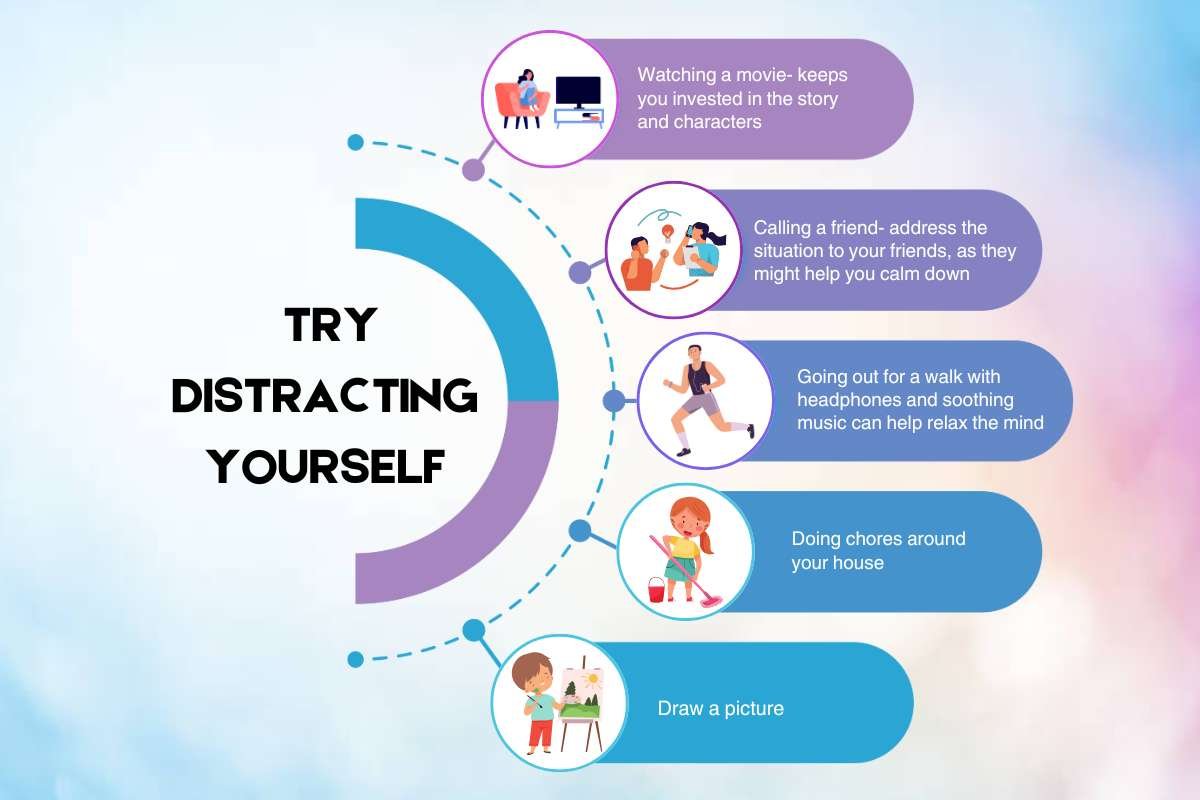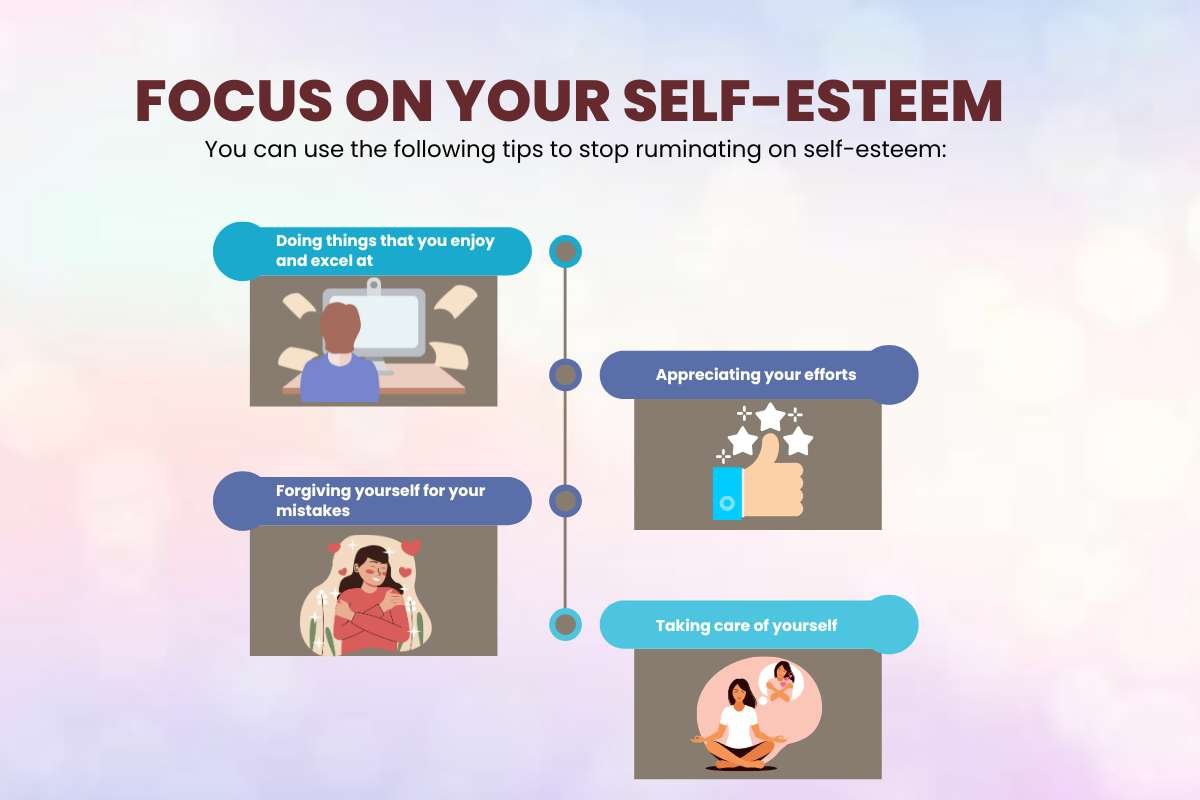Have you ever heard of the term ruminating? Well, how about overthinking? Sounds familiar right? The habit of overthinking or ruminating is shunned by claiming to be any other kind of issue. Mentioning the term issue justifies that it can have severe side effects on an individual.
Rumination is common among people but is surely an issue that must be recognized. This article will provide insights on rumination, what causes individuals to fall prey to it, and tips to stop ruminating for mental health and well-being.
What is Ruminating?
Many of us find ourselves trapped in a never-ending cycle of replaying conversations, experiences, and events and overthinking about mistakes and negatives that happened in our lives. This habit is known as rumination, and it is emotionally exhausting and mentally draining. It acts as a driving factor for increased anxiety and stress, impacting our ability to concentrate or make decisions and significantly affecting our mental health. Instead of giving solutions, rumination makes us trapped in the negative loop of self-doubt and stress, making it difficult to think about practicality and the present moments. Rumination is a symptom of other mental conditions like Obsessive-Compulsive Disorder (OCD), PTSD, anxiety, and depression.
These fragmented thought patterns can be challenging to overcome but can be subdued by the right process.
What are the Major Steps to Overcomes the Ruminating and Find Calm ?
If you’re feeling distressed by overwhelming thoughts, these simple strategies can help you break the cycle and make positive changes in your thinking.
1. Identify The Source of Your Triggers
Identifying the source of trigger points is one of the effective tips to stop ruminating. Reducing the overwhelming thought patterns does not happen overnight. It is a slow and step-by-step process.
The first stage includes identifying the source of the trigger. People often endure traumatic experiences, and small triggers may be overlooked or dismissed as ordinary moments. They act as a root cause for such fragmented thoughts. Individuals must be aware of the triggering moments or note them down to overcome ruminating.
Other reasons that are associated with rumination include anxiety, perfectionism, and depression. Identifying the triggering points can help you understand rumination better and may help determine if talking to a mental health professional is beneficial.
2. Try Distracting Yourself

Ruminating often leads to anxiety attacks. These attacks can lead to a threatening aftermath. Try distracting yourself during those challenging times.
For instance, you experienced a panic attack and to avoid that, the following tips to stop ruminating might be considered:
- Watching a movie- keeps you invested in the story and characters
- Calling a friend- address the situation to your friends, as they might help you calm down
- Going out for a walk with headphones and soothing music can help relax the mind
- Doing chores around your house
- Draw a picture
3. Know What You Can Control
Reviewing your negative thoughts might be one of the effective tips to stop ruminating.
For example, suppose you start ruminating about an upcoming exam and are constantly in the pursuit of self-doubt and fear of failure. You cannot avoid the scenario, but what can you do? In that case, you can start by determining what aspects of the exam you can control. You might have a firm grip on a specific topic. Devise an effective schedule to prepare for the topic you are doubtful about. This helps in reducing rumination.
4. Meditation and Deep Breathing
Tips to stop ruminating include meditating and deep breathing. Meditation aims at clearing the mental headspace of negative thoughts. You can become more aware of your thoughts and emotions through deep breathing.
So whenever you feel like you are stuck in the loop of negative thoughts, sit in a quiet place and start by taking deep breaths and meditating to gain control of emotions.
5. Set a Time Limit

Setting boundaries around your thoughts will help you gain control over rumination. The best practice would be setting up a worry timer. Set up a timer for a few minutes every day to address your concerns. Once the timer sets off, get back to the present and concentrate on the other things.
6. Give a Name To Your Rumination
You can take control of your rumination by giving it an identity to it. This is one of the effective tips to stop ruminating. Naming the thoughts will make you aware of their nature, but gives you the power to not give attention to those thoughts. \
You can use the following technique:
Give a quirky name to your negative thoughts. When it is around the corner you can be like- “Hey (quirky name), I can see that you’re here, but I am not going to join you on this risky escapade right now.”
Remember, the name must not be directly tied to the nature of your thoughts. This effective strategy is suggested in many therapeutic sessions.
7. Journal Your Thoughts
This is one of the simple tips to stop ruminating. Journaling your negative thoughts allows you to feel emotions, gain perspective, and gain control over them. It will help me understand things more clearly. It is a great way to organize your thoughts and identify the thought patterns.
8. Set Your Own Expectations
The constant self-evaluation is hard to escape from. If you set your targets too high, you may find it difficult to achieve them. This results in questioning your self-worth, eventually leading to negative ruminations like, “I will never be good enough.”
- Take it slow– Understand your strengths and set achievable targets. Over the period, you can evaluate what you can do and make significant adjustments.
9. Focus On Your Self-Esteem

People with difficulties in self-esteem are bound to undergo rumination. This may occur when you perform poorly at something that is important. Avoid that by appreciating the efforts that you have put in. This instills a positive energy, makes you feel more confident, and diverts from negative thoughts.
You can use the following tips to stop ruminating on self-esteem:
- Doing things that you enjoy and excel at
- Forgiving yourself for your mistakes
- Appreciating your efforts
- Taking care of yourself
10. Try Therapy
Constant rumination may be caused by traumatic experiences. It increases the anxiety and stress levels. If you are constantly ruminating on negative thoughts, you might want to consider going for therapy sessions. Therapists help you navigate your thoughts and find the root causes of them. Cognitive Behavioral Therapy (CBT) will help discover new methods to address your thoughts.
Why Is Rumination Hard To Stop?
While these tips to stop ruminating are effective, diverting away from negative thoughts is not easy. People must understand and acknowledge the thought patterns. Rumination becomes a routine over time due to anxiety, stress, and depression. Remember that nothing is going to last longer, and it takes some time to change the patterns. Be patient, give yourself time to understand, and follow these strategies to stop ruminating.
Summary
Ruminations are commonly ruled out as a regular issue. But it can take a serious toll on your mental health and emotional well-being. Getting trapped in the loop of negative thoughts is a mental drain as you might feel that you cannot refrain from them. By following these tips to stop ruminating, you can learn to manage your thoughts, reduce stress, and instill a more positive mindset. Remember that overcoming rumination is a journey, and it takes time to bring a change in your mind space. Start slowly with one or two tips and gradually include more as you like. With patience and consistency, you can bring out the piece of mind and improve your mental health.









